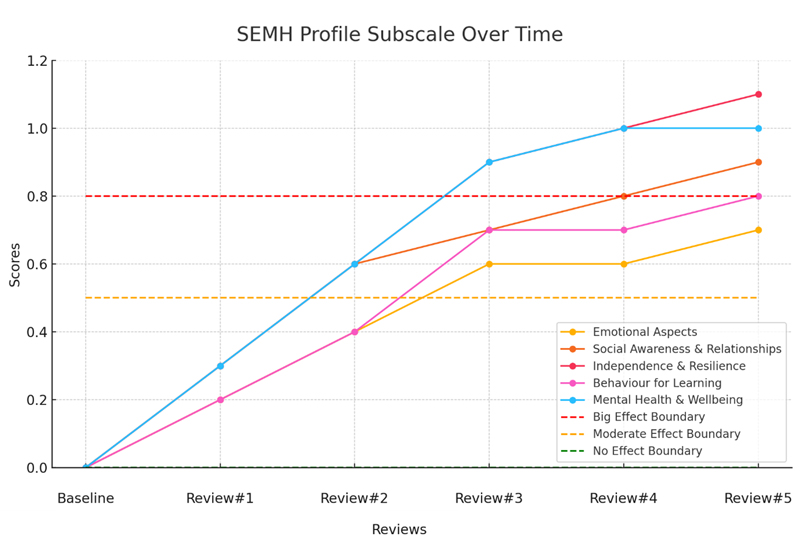Education loves an acronym, and this week, it has been given a gift. RI is set to become available again once Ofsted has done away with ‘Requires Improvement’. My hope is that it will come to symbolise something far more constructive.
The government’s clear direction of travel is towards more inclusive mainstream schools. This is central to their attempts to resolve the SEND crisis, and will also be crucial in bringing down suspensions and exclusions, as well as solving recruitment and retention challenges exacerbated by poor behaviour.
But how? Enter our new RI. Relational Inclusion refers to an approach aimed at fostering a holistic, compassionate and trauma-informed environment for all students, including those with complex needs.
It is grounded in the understanding that children’s behaviour and emotional responses are often shaped by their experiences, particularly adverse or traumatic ones, and that meaningful relationships are central to their sense of belonging, emotional wellbeing and ability to learn.
In practice, RI means adopting a preventative, supportive set of practices, where everyone from school leaders to support staff is involved in creating a nurturing environment. This contrasts with traditional behaviour management models which are often reactive, compliance-driven and focused on discipline, potentially exacerbating distress among vulnerable students.
Relational Inclusion does not mean excusing poor behaviour, removing consequences, allowing children to ‘get away with things’or eliminating rules and boundaries. Instead, it promotes firm but fair boundaries applied with empathy and understanding.
Implementing RI means following five guiding principles.
If a child could do better, they would
Many children and young people don’t know why they behave the way they do. Their early negative experiences mean their autonomic nervous system is convinced that adults can’t be trusted and all environments contain hidden threats. We all play a role in proving the contrary.
Relationships are the be all and end all
By relationship, we mean the relationship from the student’s perspective and from the staff’s. We also mean the relationships each of us has with ourself and our own wellbeing. Relationships crucially include those with families and our communities too, and it is crucial that we hold ourselves accountable as leaders for how all of these relationships are formed and maintained.
Positive staff-student relationships are known to contribute to students’ attendance, attainment, engagement and behaviours. They can also help to overcome educational disadvantage.
Accept all emotions, not all behaviours
RI is founded on the unconditional acceptance of the emotional experience that lies behind behaviour.
This does not preclude or exclude communicating that behaviour is unacceptable when it is. However, the focus is on how the behaviour gets in the way of healthy relationship development or learning.
That means discipline is based on the needs of the young person, not ours, and that our strategies must work with a student’s biology instead of against it.
Co-regulation must occur before self-regulation can be learnt and this will only happen when a child feels safe, rather than when we say they are.
Address the cause, not the symptoms
For some, the unmet need at the root of their behaviour is simply a need for boundaries. For others, that relationship is more complicated. Complicated behaviours deserve more complex, ‘state dependent’ interventions rather than a one-size-fits-all response.
Foster a culture of compassion and repair
Every interaction is an opportunity for repair, re-attunement and growth. Repairing relationships requires us as adults to model what we want to see: regulating our own emotions, avoiding taking challenging behaviour personally and focusing on helping children learn from their mistakes rather than simply punishing them.
Taking this approach in our social, emotional and mental health (SEMH) specialist schools has significantly reduced suspensions and permanent exclusions and dramatically improved attendance and engagement.
One group of schools we have supported to use this approach have seen suspensions fall by 75 per cent.
We partnered with Victorious Academies and the Laurel Trust to complete an 18-month research-based pilot. The report, to be published in late spring, shows school leaders, staff and children all report a greater sense of wellbeing and belonging.
The numbers tell of cohort-wide impact
One key stage 2 student described being plagued with concerns and unable to even enter the hall at the start of an intervention. “Now I don’t really have any worries, except for my dad’s blood sugar levels.”
Another describes using the word “dysregulated” to tell their parents about how they are feeling. “It’s good because she knows that sometimes I just need some time to calm down… I told her that being alone helps me and she gets it most the time.”
And the numbers tell of cohort-wide impact.

Graph 1 depicts the progress of five SEMH subscales over six review points, starting from the baseline and ending at the fifth review. These are ‘emotional aspects’, ‘social awareness and relationships’, ‘independence and resilience’, ‘mental health and wellbeing’, and ‘behaviour for learning’.
All subscales show steady progress over time, starting at zero (no effect at baseline) and gradually increasing.
‘Social awareness and relationships’ and ‘independence and resilience’ demonstrate the largest improvements, reaching or exceeding a score of 1.0 by review 5. ‘Mental health and wellbeing’ also shows consistent growth, plateauing slightly at a score of 1.0 after review 4. ‘Behaviour for learning’ and ‘emotional aspects’ progress more gradually, but still show encouraging upward trends.
The pilot also demonstrated a positive improvement with attendance of the key cohort.
Average attendance increased from 94.11 per cent pre-pilot to 95.10 per cent post-pilot. There was a slight dip in average attendance to 93.55 per cent during the mid-pilot phase, but the end result was an average improvement of 0.99 percentage points.
Our SEMH schools have seen dramatic improvement
Nearly one-quarter (24 per cent) of the cohort achieved 100 per cent attendance, and the group as a whole racked up an additional 173 additional school days compared to their pre-pilot attendance levels – approximately two extra school weeks per child.
The government are going to invest £740 million to adapt buildings to increase the number of places in mainstream schools for pupils with special educational needs. My concern and worry is that nothing is actually going to be any different for these children.
Sending children with complex needs back to schools who have already said ‘they can’t meet need’ does not address the core issue of inclusion. We need to go beyond the physical adaptations to buildings and change culture and policy. New buildings and extra space alone won’t do that.
What we need is a thorough training and support programme which will change current practice and introduce a truly inclusive model which enables all children to thrive and survive. Relational Inclusion is one such approach, and our pilot shows the extent of its promise.
Schools aren’t always easy places to navigate, either for staff or for children and young people. As Charles Glassman says: ‘Kindness begins with the understanding that we all struggle’.We must apply this to all that we do, as often as possible, if we stand any chance of meeting the challenges we face today.
Let’s stop talking about the SEND crisis, the exclusions crisis, the behaviour crisis and the workforce crisis as if they are separate. They are the four subscales of a wider problem.
The government is right: We have a belonging crisis. Now let’s hope its solutions match its diagnosis.
Educating everyone: An introduction to relational inclusion in schools by Anthony Benedict and Alan Braven will be published by Routledge this April.
A summary of the research: Relational Inclusion – A Primary Pilot, will be published by the Laurel Trust in late Spring in a collection of studies called Celebrating research that gets results.












Your thoughts